by Colin Deerwood
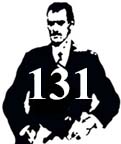
The cops finally caught up with me. Hogan, specifically. I had stopped at the newsstand around the corner from Hopper’s Diner, the daily blat’s headline blaring Bombers Blast Britain. It was another headline below the fold that caught my eye, Missing Ridley Constable Sought For Questioning. I was curious. Maybe Marie had stirred up a ruckus. I was on my way back to Alice’s old basement studio from the passport bureau with my new identity tucked in the breast pocket of my darker than tan suit coat. Almost two weeks had passed since I’d snuck back into the bad Apple. A lot had changed, and for me, for the better.
The five grand from the sale of the art piece had done wonders for my spirits, only the best mash, and my wardrobe, only the best haberdasher. It had also gone to the Uptown Downtown barber shop over on Seventh where I had had my mug given a going over. When I stepped out of the chair I was sporting a precise VanDyke. It went well with my sporty beige fedora with the fly fish feathers in the band and my new identity as Dr. Jerome Paulsen, O.D. Maybe the freedom of having a pile made me reckless. People were still looking for me. I’d let my guard down. But in my dark glasses and new duds, even the newsboy didn’t recognize me at first, and I’d been buying newspapers, girlies, pulps, and my Lucky Strikes from him for years.
I considered buying the latest issue of the crime fiction magazine, Black Mask. I’m not a big reader, especially of imaginary crime, but my old mug was on the cover of this one. I could see where Larry Jakes had got the color of the bruise under one eye just right.
I was about to take a closer look when I heard a familiar voice behind me. “You think you can fool me, wisenheimer? I’d know you anywhere, even in your dark glasses. You’re what every parent’s bad dreams are made of.”
I couldn’t help but grin. Jake Hogan and I went way back to the old neighborhood where I’d grown up, mostly on the street. He’d been the rookie beat cop back then. We were all wisenheimers to him, Ralphie Silver, Stevie Silverman, and me as well as a handful of other faces on the block. We thought we were the toughest guys on the East Side. He threatened to haul us down to the station just to get our attention, and when that didn’t work, and we got older, he did haul us in, and that meant that our parents had to come and get us, and sometimes that was worse than being taken in. “I guess I should say thanks for keeping an eye of me all these years.”
“Where’d you get the money to suit up like that? Last time I saw you, you looked like you were sharing a wardrobe with a moth.”
“Inheritance?” I coughed.
“Oh yeah, who from? I know it ain’t from your old man. And I don’t think it’s from your mother, either.”
“A rich uncle.”
“He got a name?”
“Ned. Ned Ask.”
“Ned? That the best you can come up with?”
“Honest. His full name is Nedan T. Ask.”
“What’s the T stand for?”
“I dunno, Ted, Tom?” All of a sudden I felt like I was ten years old again, caught doing something I wasn’t supposed to do.
“That’s a nice story, wisenheimer, but I still got to take you downtown.”
“Come on, Hogan, you don’t think I had anything to do with Ralphie’s murder, do ya?”
He shook his head slowly, giving me the patented intense cop stare. “No, I don’t think you did Ralphie, wisenheimer. You ain’t got the guts or the brains.”
“Then whadya want with me?”
“Oh, I got questions about that crew that ended up full of holes at Kovic’s warehouse. But it ain’t only me, the government boys wanna have a word.”
“Listen, Hogan, this is all Ralphie’s fault.”
“There you go, blaming a dead man. I can’t say I’m surprised.” He jerked his thumb over his shoulder. “Let’s go.”
“Wait, wait. Let’s talk about this. There’s something you should know.” My chances at a clean getaway were fading fast. If Hogan took me in, I’d be a sitting duck for Kovic’s stoolies and anyone else who would want to get their hands on me. And I wanted to avoid the feds at all costs. “How about I buy you a cup of coffee over at Hopper’s diner?” I was gonna throw in the offer of a donut but I know how sensitive cops can be about that. “You know Ralphie,” I pleaded, “it was always his schemes that got the rest of us in trouble. And this whole chain of events started because Ralphie said he had a job for me. Hear me out. Ok?”
Hogan cocked his head to one side, surprised. He’d never heard any of us beg, no matter how deep a mess we were in.
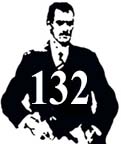
“It all started with Kovic’s daughter.”
“Don’t tell me.” Hogan smirked over his cup of steaming java.
“Naw, nothing like that.” And I went on to tell him about how Ralphie Silver had set it up. I was going to be paid to find the mob boss’s daughter. Ralphie thought he could maybe get some of his gambling debt forgotten if I could bring her back to daddy. She had a history of running away and the old man usually sent one of his goons to retrieve her. But this time, it was way out of State, and South. His dapper boys would have been made out to be city slickers and the local law would be onto them like white on rice. As I could pose as a traveling salesman on my way through town without any problem.
Hogan grunted and shook his head when I told him how Kovic had stiffed me and left me for dead in a ditch on the island. And how I was determined to get what was owed me, with interest. But in the meantime, my pal, Al, the pearl diver at Madame Cho’s chop-suey joint, hooked me up with his sister, Della, who wanted me to find her boyfriend who had stolen something from her. “That’s how I got pulled in on suspicion of murdering him.”
“Yeah, I remember that. I knew that wasn’t you. It was a professional hit. I can’t figure why. He was a no account pimp. And his girlfriend wanted something he stole from her? I wonder what that was.”
I shrugged. “I never got the chance to find out.” I left out the fact that I had filched the postal slip from Della’s mailbox. “Of course that was before I knew that she and her brother were part of a robbery gang who called themselves the Thieves of Bombay.” And before I knew that waiting to be picked up at the post office was the exotic erotic jade, the Empress’s Cucumber.
I thought about the empty bank deposit envelope in the cigar box back at the basement studio where I was lying low, and the postal package notice it had once held. Della with her dying breath had told me she had mailed the jewelry box containing the rare jade to herself. Why was the postal slip missing? I was certain Rebecca had it on her that day. But she was dead. No one survives a fall four stories up.
“So not long after that, I’m in a phone booth where I find an address book somebody forgot. I woulda returned it but I couldn’t read it.” I didn’t want to say I lifted the wallet from a man drowning in the East River.
“I told ya, you shoulda stayed in school.”
“Naw, nothing like that. I can read alright. This wasn’t in regular writing. Something called Serial writing.”
“Serial writing? You mean like in the pulps?”
“I don’t think so. Whatever it was, it was Greek to me.”
“Waitaminute. Do you mean Cyrilic?”
“Yeah, probably. That sounds right. No way I can return it if I can’t read it so I stick it in my pocket. I go to buy a cheap suit from a tailor, see, and as he is taking my measurements, I’m trying on the suit coat, the address book drops out of my old one. He picks it up and gives it back to me and when he does, he sees the writing. He’s kinda shocked, probably because I don’t look the type to be reading that cockamamie scrawl. And he’s right. I do ok with the ABC’s and I don’t see why I gotta know anything else. Anyway, he says he can’t read it well but he knows someone who might, a rabbi, at some uptown address, and that I should see if he can’t help me.”
“Are you going somewhere with this, wisenheimer? If you keep droning on, I’m gonna need another cup of coffee.”
“Well, as it turns out the tailor has a daughter. . . .”
“Ok, I shoulda seen that coming.”
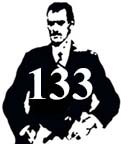
I had to watch my step with the story. Hogan didn’t need to know about the diamonds. It was best that I stuck with the beef I had with Kovic. I had tipped him to the crates of machine guns at the Serbian Social Club where I had gone, foolishly, to enact some kind of revenge because my old man taught me, somebody hits you, hit them back twice as hard. He didn’t say anything about a brick wall and hitting it twice as hard hurts twice as much. And I’d told Hogan about the heist at the Customs Warehouse and the threat to the grand jury investigating Kovic’s control of the waterfront. But how to explain Rebecca.
“Is she the one that jumped off the roof of that social club?”
“She didn’t jump. There was an explosion, remember? She was knocked off the terrace.” I didn’t have to tell him that it was Rebecca’s father who had built the bomb and planted it there on orders from Herr Doktor Soloman and his clandestine diamond syndicate.
“We never found a body so unless she walked, you’re imagining things.”
I had to think on that for a bit. “So Kovic grabs me, he thinks I set the bomb. They scram before the keystones can get there, and take me with them to the warehouse. Which is where you found me in the aftermath of the shootout.”
Hogan shook his head. “I can’t figure that one out. Once we started making identification of the bodies at Kovic’s warehouse, we realized we were on to an international gang that target the wealthy for their jewelry and their art. We’d been after them for a while as the ones who had been taking down high society penthouses and their art collections. I don’t see how Kovic fits in there. And the feds are still looking for him.”
“I don’t either but I heard he wanted me dead. And which is why I took it on the lam and laid low up in the Lakes country waiting for it to blow over. That’s where I learned my uncle had died and he had left me a little something in his will. I’m just in town wrapping up some business. I like it up in the country and I’m thinking of going back there to live. Start a new life, stay out of trouble.”
Hogan snorted. “Not a chance. Besides there’s the little matter of the victim’s statement.”
“Victim?”
“Yeah, a certain Alice Neal. About a month ago she was attacked in her studio by two men who were looking for you and the dame. Only thing that stopped them from murdering her was a crazy Czarist and his rapier. You’re an acquaintance of Miss Neal? You were seen leaving her dwelling recently. ”
“I’ll bet Kovic was behind it.”
Hogan shook his head. “Kovic’s goons don’t wear goggles. That one’s still a mystery. The same crew shot up a diamond dealer a while back. So far all the leads point to Chinatown.”
“Forget it, Jake, it’s Chinatown.”
He laughed and it was a rare occasion when he did that. “I’m gonna thank you for the cup and I’m still gonna extend my hospitality and invite you downtown to sample some of the swill they call java.”
“Wait, what if I told you something that would get you in good with the G-men and get you a load of commendations and maybe even a handshake with the mayor.”
Hogan didn’t get where he was by ignoring situations that would put him in a good light. “I’m listening.”
“I know where Kovic is hiding out. You think that information could buy me a pass?”
“I could take you down to the precinct and beat it out of you.”
“Listen, Hogan, I just want to move to the country and get out of this rat race, make an honest living.”
“You should have quit while you were ahead, wisenheimer. Honest ain’t in your blood, and why would a rat leave the race when that’s the only thing he knows.” He sat back in the booth, a spiteful grin creasing his mug. “But ok, spill.”
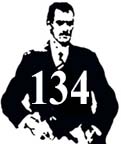
“Chinatown.” That’s when it all fell into place. Hogan saying that all the leads pointed to Chinatown was the piece I was missing. The goggle bandits, of course. They resembled owls. And that’s what Max Feathers was called by the Chinese denizens in the neighborhood of his pawn shop, māo tóu yīng, the cat headed eagle. The Owl.
I stood in a doorway across the street from the pawn shop. I’d left Hogan holding up his end of the bargain. “For once you done something right, wisenheimer,” he’d said, “Just don’t leave town.” I had every intention of leaving town. My bags were packed and I’d made arrangements with Annie Bassinger, the tugboat captain. There was a freighter due to sail in the wee hours of the next morning and I was going to be on it. But first I had to take care of some unfinished business.
The front of the shop was dark, but a light shone against the ceiling at the far back where Max sat in his cage. I’d gone back to the basement studio and looked in the cigar box again. The empty deposit envelope, the cloth sachet that had held the uncut rocks, and slipped Rebecca’s peashooter into my pocket. The street was the usual hustle and bustle for the time of day, wagons and trucks and a smattering of foot traffic but mostly further up the block where the street stalls were set up. I waited for an old woman, bent forward on a cane, a scarf close around her face, to wobble past the entrance to the shop before I made my move.
The bell over the door tinkled. I quickly made my way through the racks of clothing and stacks of boxes to the cage. Max, his back to me, seated in his chair didn’t turn around until I was right up to the counter. He blinked at first and then nodded in recognition. “Lackland Ask, to what do I owe this pleasure?”
“I got a bone to pick with you, Max.”
An evil smile creased his unshaven cheeks and he rolled his chair up to the teller caged counter. “Should I put you on a waiting list?”
“I’m taking cuts, Max. I brought that diamond here for you to appraise. And I told you I was gonna cut you in on the deal when the rabbi’s people paid me off for the address book. But you had to get greedy, you wanted it all.”
This time he laughed, exposing the ruins in his mouth. “Is that not the purpose of this madness? To want it all, to get it all?”
“You offered Rebecca the red brocade dress as an engagement present delivered to the address she gave you. You figured that’s where the diamonds were and you sent your boys to get them.”
“Do nothing in half measures, I learned long ago. Not only were the diamonds an opportunity but you, yourself, as well. With Mr. K’s price on your head, it was one I could not pass up.”
“Keep your hands where I can see them, Max. I know you’ve got a gat squirreled away on the shelf below.” I pulled the pistol from my pocket and pointed it at him.
He grinned and shrugged. “If you must know, I would have the diamonds and the finder’s fee from Mister K. My owls swooped in on their prey only to meet with fierce resistance and find the diamonds gone and you missing. I assumed that you and the diamonds had left together. I had your so-called office watched. The super was very cooperative. The sister act failed to fool him. He alerted my man who followed them to the woman’s studio. My owls swooped in only to find you not there and themselves dead. Unfortunate, but often the fate of soldiers for the cause.”
The bell over the door tinkled as someone entered the pawn shop. “Closed!” Max called out not taking his eyes off me or the gun. And then “Guānbì” in case it was one of the locals. The bell above the door sounded again. “The diamonds have entered the market so I hear. Whomever had them has made a tidy profit, and judging by your accouterments, you have come into some money. Only one thing puzzles me. According to my sources, the person who sold the uncut gems was a woman. Do I have to ask? Someone you know?”
That confused me, someone, a woman, had sold the uncut diamonds, and it must have shown. I hesitated as he brought the automatic to bear on me. “But I have you, Ask, and Mr. K’s offer is still standing. His current troubles with the authorities will be short lived and has not slackened his thirst for revenge.”
I pulled the trigger and nothing happened. I pulled it again with the same results.
Max was enjoying my panic. “You will kill me with your comedy, Lackland Ask. You in your fancy clothes, ridiculous beard, dark glasses, and toy pistol. I will die laughing. But before that happens, you will suffer a horrible death at the hands of Yan Kovic.”
Out of the corner of my eye I caught a movement followed by the shadow of a shape. Max didn’t realize until too late that we were not alone. It was the old woman in the head scarf I’d seen creeping along the sidewalk before I entered the pawn shop. Only it wasn’t an old woman after all. It was Rebecca. And she had a gun in her hand, a big gun. “Try this on for laughs, Max.” Her revolver barked. Max held his chest with a look on his face like something he ate didn’t agree with him, a lead pill, as he slowly spilled out of his chair and onto the floor behind the counter.
“Becky! I thought. . .the explosion. . .you fell. . . .”
“I didn’t fall, Lack. I jumped.” She pointed the gun at me. “I jumped from the ledge to the fire escape just as the bomb went off. I was certain that you were dead. In the commotion I was able to get out of the building unseen.”
“You’re alive!” I wanted to hold her in my arms but the gun wouldn’t let me.
“I don’t want to see you again, Lack. Don’t come looking for me, otherwise I will be forced to kill you. Forget me, you don’t even know my real name.”
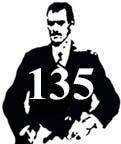
How could I have been so blind? I kicked myself with the thought of how I had been fooled all the way back to the studio where I grabbed my satchel and left without leaving a note. I needed to make my exit before more bodies started piling up, one of which, to believe Rebecca, could very well be mine. All the same my mind was feverishly trying to make sense of how Rebecca was alive when I’d been certain she was dead, shocked and relieved because I’d been blaming myself all this time. What didn’t square was how she had the diamonds all along and had no intention of giving me my cut. How could I have missed that? I’m nothing if not skeptical, I can spot a con a long way coming. But not this, dazzled by a pretty face and womanly wiles.
She brushed off the double cross, saying that she needed the money to finance her goal of fighting fascism and the oppression of the working class wherever it arose. And the way she saw it, there was a lot of that in the States.
This was not the naïve kid I thought I was protecting from the mean cruel world. The tables were turned and I was the dupe being led around by a sharp cookie.
She didn’t want to go into detail about what she’d been up to since the night of the explosion, the night we’d made love in the shabby hotel, but I assumed fencing the diamonds had been some of it. She had some unfinished business she said, and it had to do with the jade, the Empress’s Cucumber, which explained the empty bank deposit envelope. But why be so careless to leave those things behind in the cigar box?
With a shrug of cruel indifference, she explained that she had redeemed the package with the postal call slip, and it contained the Empress’s Cucumber that Della had mailed to herself. The only problem was that the jade was a fake, a soapstone replica. Someone had switched the authentic jade with an imitation jade cucumber.
I had to think about that for a bit. The only time that the swap could have been made was when it was in the possession of Della’s pimp boyfriend, the one who was murdered. The Thieves had got it in a heist of a collector’s penthouse. Then someone stole it from them and left the fake behind. It was a wily move and I knew exactly just who could have pulled it off. He was gargling blood and thrashing on the floor behind the counter, The Owl.
Rebecca had come to the same conclusion when she discovered that it was a replica. She had stumbled upon the authentic jade after Max had offered her an engagement present. It had been a ruse to get her address where he would have the red brocade dress delivered, assuming, correctly, that the diamonds would be found where she lived. Max was hiding the Empress’s Cucumber in plain sight. She’d never received the red dress either, it was still hanging on the rack, so she was taking it and the jade as well.
That’s the way I’ll always remember her, revolver pointed at me, dress over one arm, imperial green brocade box in the other, backing out the door to the hubbub of the street outside. Rebecca was not who I thought she was. That accent, the innocent act, had me fooled good. I figured I wasn’t the first and I wouldn’t be the last. She wanted the power to change the world because she was a formidable woman, the money from the sale of the rocks and the authority of the Empress’s Cucumber would make her what the Chinese call qing guo qing cheng, a terrifyingly powerful woman. A flash of red and she was gone. I had to wonder, is she working for Uncle Joe or just a rebel with a just cause, the Joan of Arc in all women? That’s why when I think of her I think of her as the Red Empress.
I stood atop the accommodation ladder looking out over the smear of lighted early morning skyline behind the scrim of a thick fog. In the churning waters below, the stern of the tug Narcissus was pulling away from the freighter’s towering hull. I’d said my goodbyes to Annie, telling her that she was one of the reasons I wished I could stay. “Then stay,” she pleaded, “Get your seaman papers. Ship out to the West Coast, Hawaii, I hear it’s pretty safe out there.” But, nah, my old man was one, and that wasn’t me. Robal, one of Annie’s crew, had given me the name of someone to look up when I got to Havana who would connect me with someone else to get me the rest of the way. Valparaiso, no one would ever think of looking for you there, an old mobster told me once. I was travelling light, a change of clothes and my new name as a visually impaired optometrist, like it said on my passport. Some people might appreciate the irony and refer to me as “the blind man”, a really private eye. Maybe I could get into the art collection con south of the Equator. Open an art gallery, call it The Blind Man.
The first mate interrupted my reverie and indicated the direction with an outstretched arm. “This way to your cabin, Dr. Paulsen. The Captain looks forward to meeting you at breakfast.” I stepped through the hatch and into the passageway where fastened to the bulkhead was a life ring displaying the ship’s name, the S.S. Van Dyne.
END
Is there a sequel in the making? Featuring The Red Empress, The Blindman, The Owl, and Mr. K? Stay tuned to Dime Pulp, The Serial Pulp Fiction Magazine!
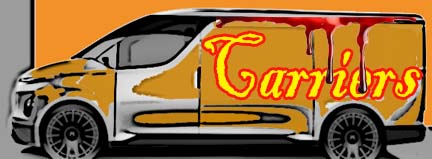 Mark DuCharme’s Carriers and it’s gothic air of shadowy creatures who might just be the living dead is a vampire novella with touches of black comedy and satirical bite, told from the perspective of its unreliable narrator and protagonist. Taking place during a “plague” that has been going on for two years in an unnamed city, dead bodies litter the streets, hallways, and homes. A corpse disposal company hires people to transport them to a facility at the edge of town with the very important stipulation that the bodies be delivered there before sundown. No one ever says why. Read more in the latest installment of Carriers, Episodes X-XII .
Mark DuCharme’s Carriers and it’s gothic air of shadowy creatures who might just be the living dead is a vampire novella with touches of black comedy and satirical bite, told from the perspective of its unreliable narrator and protagonist. Taking place during a “plague” that has been going on for two years in an unnamed city, dead bodies litter the streets, hallways, and homes. A corpse disposal company hires people to transport them to a facility at the edge of town with the very important stipulation that the bodies be delivered there before sundown. No one ever says why. Read more in the latest installment of Carriers, Episodes X-XII .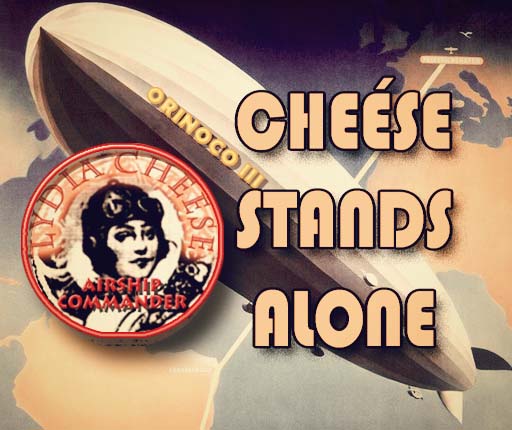 Phyllis Huldarsdottir’s Cheése Stands Alone, the continuing adventures of Airship Commander Lydia Cheése (pronounced “Chase”) in the search for her anti-Clockwork Commonwealth renegade father, Commodore Jack, with the help Doctor Professor Jean-Pierre Serre-Pain, proprietor the Madame Ophelia’s Ophidiarium, a traveling snake show, and his associates, former circus strongman, Vlady, and Serpina, the snake girl. On the run from IOTA (the Investigative Office of The Admiralty), she has narrowly escapes capture by her nemesis, Chief Inspector Karla Kola, in Oldest Orleans, and now with the help of a young wannabe airship pilot, Pyare, must traverse the Central Massif to rendezvous with Serre-Pain and the dirigible that will take them on a mercy mission to HOAR (the Horn Of Africa Republics), base for the anti-Commonwealth ICERS. Read more of Cheése Stands Alone in Episode XIII.
Phyllis Huldarsdottir’s Cheése Stands Alone, the continuing adventures of Airship Commander Lydia Cheése (pronounced “Chase”) in the search for her anti-Clockwork Commonwealth renegade father, Commodore Jack, with the help Doctor Professor Jean-Pierre Serre-Pain, proprietor the Madame Ophelia’s Ophidiarium, a traveling snake show, and his associates, former circus strongman, Vlady, and Serpina, the snake girl. On the run from IOTA (the Investigative Office of The Admiralty), she has narrowly escapes capture by her nemesis, Chief Inspector Karla Kola, in Oldest Orleans, and now with the help of a young wannabe airship pilot, Pyare, must traverse the Central Massif to rendezvous with Serre-Pain and the dirigible that will take them on a mercy mission to HOAR (the Horn Of Africa Republics), base for the anti-Commonwealth ICERS. Read more of Cheése Stands Alone in Episode XIII.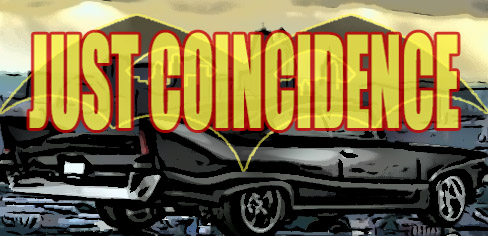 Pierre Anton Taylor’s dark crimefighting serial, Just Coincidence is about a privileged young man with the unremarkable name of Wayne Bruce who returns to the site where his father once had his business, a battery manufacturing plant, and where he often spent his childhood days hanging around the factory and the neighborhood. His return is haunted by the mysterious circumstances surrounding his father’s death and the vague feeling that his uncle is somehow involved. Appalled by the poverty and crime of the place he remembers fondly, he is moved to resolve the injustice of the socially marginalized and to wreak vengeance on those he believes are responsible for the death of his father. The backstory to his emergence as a crimefighter is revealed in Just Coincidence, Interlude II
Pierre Anton Taylor’s dark crimefighting serial, Just Coincidence is about a privileged young man with the unremarkable name of Wayne Bruce who returns to the site where his father once had his business, a battery manufacturing plant, and where he often spent his childhood days hanging around the factory and the neighborhood. His return is haunted by the mysterious circumstances surrounding his father’s death and the vague feeling that his uncle is somehow involved. Appalled by the poverty and crime of the place he remembers fondly, he is moved to resolve the injustice of the socially marginalized and to wreak vengeance on those he believes are responsible for the death of his father. The backstory to his emergence as a crimefighter is revealed in Just Coincidence, Interlude II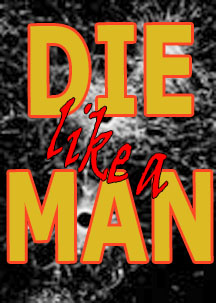




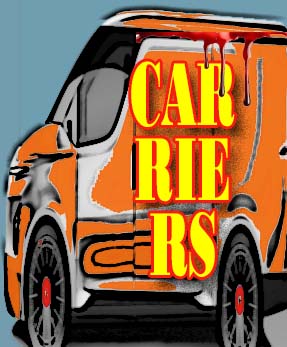 The new year at Dime Pulp begins with the return of Carriers by Mark DuCharme and it’s gothic air of shadowy creatures who might just be the living dead. Carriers is a vampire novella with touches of black comedy and satirical bite, and is told from the perspective of its unreliable narrator and protagonist, Johnny. It takes place during a “plague” that has been going on for two years in an unnamed city. Dead bodies litter the streets, hallways, and homes. A corpse disposal company hires people like Johnny to transport them to a facility at the edge of town with the very important stipulation that the bodies be delivered there before sundown. No one ever says why. Read more in the latest installment of Carriers,
The new year at Dime Pulp begins with the return of Carriers by Mark DuCharme and it’s gothic air of shadowy creatures who might just be the living dead. Carriers is a vampire novella with touches of black comedy and satirical bite, and is told from the perspective of its unreliable narrator and protagonist, Johnny. It takes place during a “plague” that has been going on for two years in an unnamed city. Dead bodies litter the streets, hallways, and homes. A corpse disposal company hires people like Johnny to transport them to a facility at the edge of town with the very important stipulation that the bodies be delivered there before sundown. No one ever says why. Read more in the latest installment of Carriers, 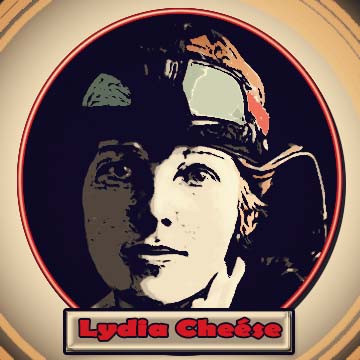 Phyllis Huldarsdottir returns with Cheése Stands Alone, the continuing adventures of Airship Commander Lydia Cheése (pronounced “Chase”) in the search for her anti-Clockwork Commonwealth renegade father, Commodore Jack, with the help Doctor Professor Jean-Pierre Serre-Pain, proprietor the Madame Ophelia’s Ophidiarium, a traveling snake show, and his associates, former circus strongman, Vlady, and Serpina, the snake girl. On the run from IOTA (the Investigative Office of The Admiralty), she has narrowly escapes capture by her nemesis, Chief Inspector Karla Kola, in Oldest Orleans, and now with the help of a young wannabe airship pilot, Pyare, must traverse the Central Massif to rendezvous with Serre-Pain and the dirigible that will take them on a mercy mission to HOAR (the Horn Of Africa Republics), base for the anti-Commonwealth ICERS. Read more of Cheése Stands Alone in
Phyllis Huldarsdottir returns with Cheése Stands Alone, the continuing adventures of Airship Commander Lydia Cheése (pronounced “Chase”) in the search for her anti-Clockwork Commonwealth renegade father, Commodore Jack, with the help Doctor Professor Jean-Pierre Serre-Pain, proprietor the Madame Ophelia’s Ophidiarium, a traveling snake show, and his associates, former circus strongman, Vlady, and Serpina, the snake girl. On the run from IOTA (the Investigative Office of The Admiralty), she has narrowly escapes capture by her nemesis, Chief Inspector Karla Kola, in Oldest Orleans, and now with the help of a young wannabe airship pilot, Pyare, must traverse the Central Massif to rendezvous with Serre-Pain and the dirigible that will take them on a mercy mission to HOAR (the Horn Of Africa Republics), base for the anti-Commonwealth ICERS. Read more of Cheése Stands Alone in 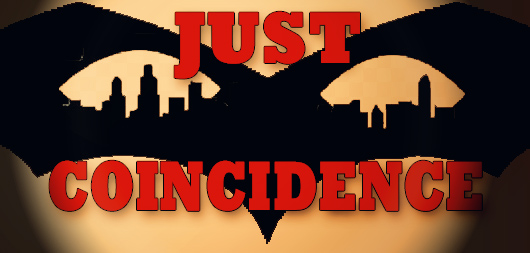 Pierre Anton Taylor’s dark crimefighting serial, Just Coincidence is about a privileged young man with the unremarkable name of Wayne Bruce who returns to the site where his father once had his business, a battery manufacturing plant, and where he often spent his childhood days hanging around the factory and the neighborhood. His return is haunted by the mysterious circumstances surrounding his father’s death and the vague feeling that his uncle is somehow involved. Appalled by the poverty and crime of the place he remembers fondly, he is moved to resolve the injustice of the socially marginalized and to wreak vengeance on those he believes are responsible for the death of his father. The backstory to his emergence as a crimefighter is revealed in
Pierre Anton Taylor’s dark crimefighting serial, Just Coincidence is about a privileged young man with the unremarkable name of Wayne Bruce who returns to the site where his father once had his business, a battery manufacturing plant, and where he often spent his childhood days hanging around the factory and the neighborhood. His return is haunted by the mysterious circumstances surrounding his father’s death and the vague feeling that his uncle is somehow involved. Appalled by the poverty and crime of the place he remembers fondly, he is moved to resolve the injustice of the socially marginalized and to wreak vengeance on those he believes are responsible for the death of his father. The backstory to his emergence as a crimefighter is revealed in 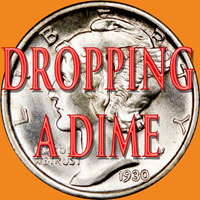 Also returning for the 2024 inaugural issue is Dropping A Dime, the editor’s pithy commentary on pulp fiction, this time asking the vital question
Also returning for the 2024 inaugural issue is Dropping A Dime, the editor’s pithy commentary on pulp fiction, this time asking the vital question 

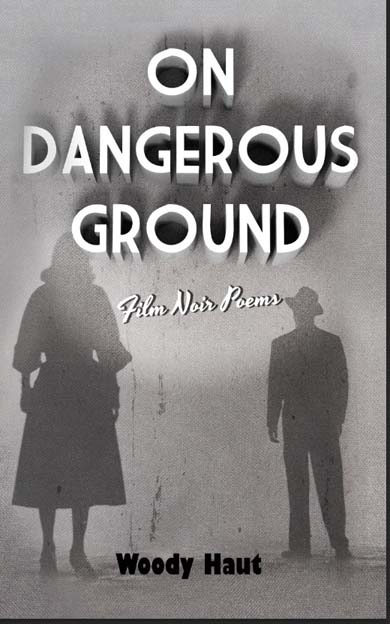 Woody Haut’s On Dangerous Ground, Film Noir Poems takes its title from the Nicholas Ray movie of the same name. As the 50 “film noir poems” illustrate, the poet is well informed in the both genres. The author of numerous critical studies of the noir genre including Pulp Culture: Hard Boiled Fiction and The Cold War and Neon Noir: Contemporary American Crime Fiction as well as a couple of noir pot boilers, Cry For a Nickel, Die For a Dime and Days of Smoke, Haut’s poems take their titles from such classics as The Big Sleep, Nightmare Alley, and Touch Of Evil as well as the lesser known films like Where The Sidewalk Ends and I Wake Up Screaming. The poems themselves are prompted by dialogue, interesting camera work, the plot, a particular scene, the acting by the actor/actress, or their depiction of a time, place and social relevance which reveals the author’s knowledgeable immersion in a distinct American genre with a French name.
Woody Haut’s On Dangerous Ground, Film Noir Poems takes its title from the Nicholas Ray movie of the same name. As the 50 “film noir poems” illustrate, the poet is well informed in the both genres. The author of numerous critical studies of the noir genre including Pulp Culture: Hard Boiled Fiction and The Cold War and Neon Noir: Contemporary American Crime Fiction as well as a couple of noir pot boilers, Cry For a Nickel, Die For a Dime and Days of Smoke, Haut’s poems take their titles from such classics as The Big Sleep, Nightmare Alley, and Touch Of Evil as well as the lesser known films like Where The Sidewalk Ends and I Wake Up Screaming. The poems themselves are prompted by dialogue, interesting camera work, the plot, a particular scene, the acting by the actor/actress, or their depiction of a time, place and social relevance which reveals the author’s knowledgeable immersion in a distinct American genre with a French name.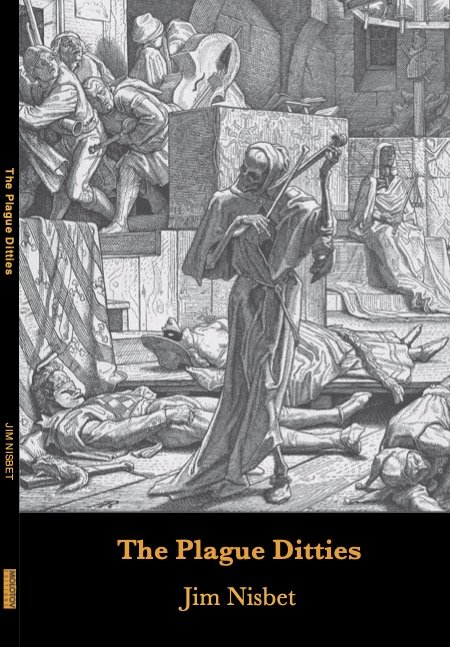 Nisbet returned to his poetry roots (not that he was ever very far from them) to put the pandemic in pentameters in a selections of poems titled Pandemic Ditties. Jim, in the late 70s was a young poet in San Francisco who wrote and declaimed his poetry in coffee houses and bookstores. He even read at the historic San Francisco Punk Poetry Festival at Terminal Concepts Gallery with such luminaries as Andrei Codrescu, Gloria Frym, Darrell Gray, and the ravishing redhead femme fatale, Victoria Rathbun, straight out of a noir drama. Obviously, as it turns out, poetry wasn’t the only thing he was writing.
Nisbet returned to his poetry roots (not that he was ever very far from them) to put the pandemic in pentameters in a selections of poems titled Pandemic Ditties. Jim, in the late 70s was a young poet in San Francisco who wrote and declaimed his poetry in coffee houses and bookstores. He even read at the historic San Francisco Punk Poetry Festival at Terminal Concepts Gallery with such luminaries as Andrei Codrescu, Gloria Frym, Darrell Gray, and the ravishing redhead femme fatale, Victoria Rathbun, straight out of a noir drama. Obviously, as it turns out, poetry wasn’t the only thing he was writing.
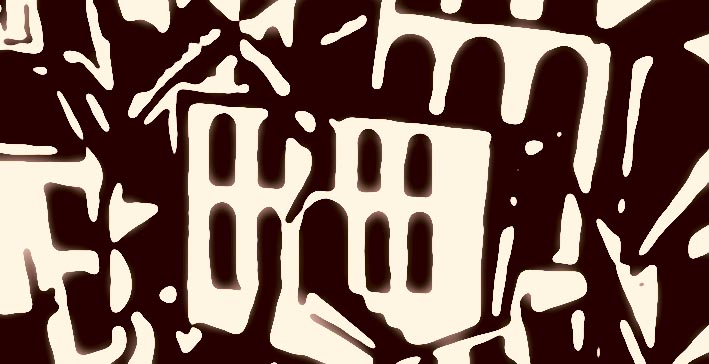

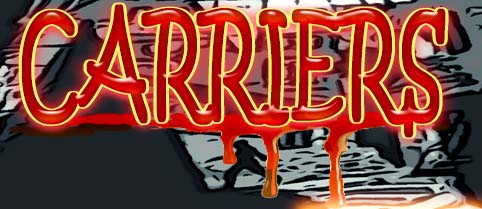 Carriers by Mark DuCharme returns with it’s gothic air of shadowy creatures who might just be the living dead. Carriers is a vampire novella with touches of black comedy and satirical bite, and is told from the perspective of its unreliable narrator and protagonist, Johnny. It takes place during a “plague” that has been going on for two years in an unnamed city. Dead bodies litter the streets, hallways, and homes. A corpse disposal company hires people like Johnny to transport them to a facility at the edge of town with the very important stipulation that the bodies be delivered there before sundown. No one ever says why. Read more in the latest installment of
Carriers by Mark DuCharme returns with it’s gothic air of shadowy creatures who might just be the living dead. Carriers is a vampire novella with touches of black comedy and satirical bite, and is told from the perspective of its unreliable narrator and protagonist, Johnny. It takes place during a “plague” that has been going on for two years in an unnamed city. Dead bodies litter the streets, hallways, and homes. A corpse disposal company hires people like Johnny to transport them to a facility at the edge of town with the very important stipulation that the bodies be delivered there before sundown. No one ever says why. Read more in the latest installment of 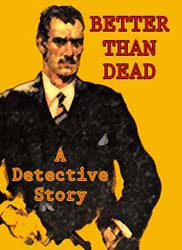 Issue 8 brings to a close Colin Deerwood’s long running serial, Better Than Dead, A Detective Story, featuring the unpredictable peregrinations of private investigator Lackland Ask, aka Stan Gardner, aka Sam Carter, and now Dr. Jerome Paulsen, O.D. leaving on a freighter for Cuba one step ahead of the law, the mob, and the draft board. All the loose ends (and there were many) are tied up or disposed of (are they?), and now the fugitive confidential agent can exit stage left. Find out how the story ends in
Issue 8 brings to a close Colin Deerwood’s long running serial, Better Than Dead, A Detective Story, featuring the unpredictable peregrinations of private investigator Lackland Ask, aka Stan Gardner, aka Sam Carter, and now Dr. Jerome Paulsen, O.D. leaving on a freighter for Cuba one step ahead of the law, the mob, and the draft board. All the loose ends (and there were many) are tied up or disposed of (are they?), and now the fugitive confidential agent can exit stage left. Find out how the story ends in 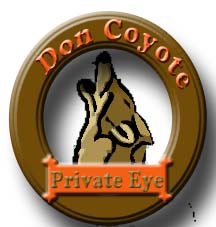 This issue also introduces a new private eye, Don Coyote, brain child of Mike Servante, a newbie to the musty (and labyrinthine) halls of serial crime fiction although an aficionado of the genre, in a metatextual story that promises to be a lot of fun, titled The Man From La Mirada Perdida, A Don Coyote & Saundra Pansy Adventure. Read inaugural episodes
This issue also introduces a new private eye, Don Coyote, brain child of Mike Servante, a newbie to the musty (and labyrinthine) halls of serial crime fiction although an aficionado of the genre, in a metatextual story that promises to be a lot of fun, titled The Man From La Mirada Perdida, A Don Coyote & Saundra Pansy Adventure. Read inaugural episodes 
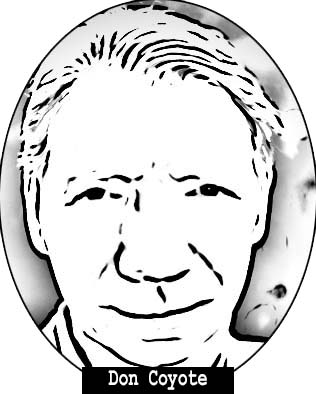 I’m a good judge of character. She was in her late forties, going gray pixie cut that went with the pixie face, dangling silver earrings, intense blue eyes, mascara thick eyelashes, not so subtle green shadowed and precisely drawn eyebrows. Her lipstick was a synthetic shade of orange and probably applied with a palette knife.
I’m a good judge of character. She was in her late forties, going gray pixie cut that went with the pixie face, dangling silver earrings, intense blue eyes, mascara thick eyelashes, not so subtle green shadowed and precisely drawn eyebrows. Her lipstick was a synthetic shade of orange and probably applied with a palette knife.  I don’t know who he thought he was, thinning red hair, tall and gangly with quite a beak, too. He dressed conservatively for this neck of the woods, slacks, open collar shirt. I’ll admit I was desperate. After Jake’s passing, I had to keep up the house payments and that meant cutting corners on other necessities. Besides, being housebound as a homemaker for a couple dozen years, I was ready to re-experience life as a single woman.
I don’t know who he thought he was, thinning red hair, tall and gangly with quite a beak, too. He dressed conservatively for this neck of the woods, slacks, open collar shirt. I’ll admit I was desperate. After Jake’s passing, I had to keep up the house payments and that meant cutting corners on other necessities. Besides, being housebound as a homemaker for a couple dozen years, I was ready to re-experience life as a single woman.




